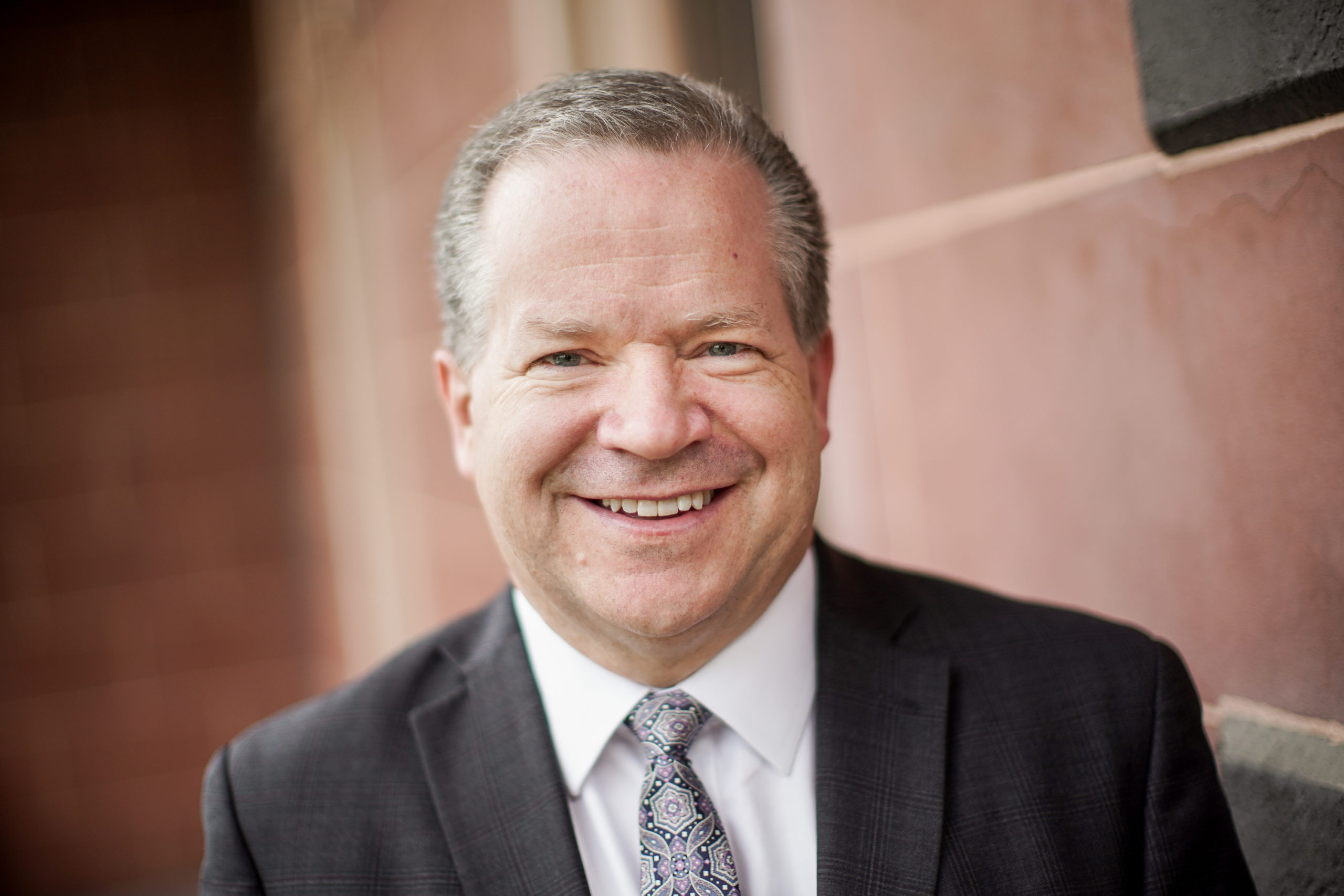Matheson: What Mitt Romney got right and most in power miss
Sep 16, 2023, 10:00 AM

Utah Sen. Mitt Romney shakes hands with ROTC students at the Sutherland Institute's 2023 Congressional Series at the Hinckley Institute on the University of Utah campus in Salt Lake City on Monday, Aug. 21, 2023. (Megan Nielsen/Deseret News)
(Megan Nielsen/Deseret News)
This is an editorial piece. An editorial, like a news article, is based on fact but also shares opinions. The opinions expressed here are solely those of the author and are not associated with our newsroom.
From the moment Utah Sen. Mitt Romney announced that he would not seek reelection there has been a flurry of sensational social media posts, a host of click-bate headlines and hours of cable news chatter. Speculation has been spewed about Romney’s comments regarding colleagues and presidents, evaluations of his time and impact in the United States Senate and all kinds of prognostication about the next race to replace here in the State of Utah.
Lost in all of it was the real important principle and lesson of the day.
Exploring the principle and lesson requires you to set aside your personal politics relating to Sen. Romney. Love him or hate him, whether you are liberal or conservative, Republican or Democrat or anything in between — there is a message we all should be thinking about relating to every elected official. Every elected official should act on the principle and lesson.
Mitt Romney was an equal opportunity offender in his announcement, decrying the current and former occupant of the Oval Office for trying to hold on to power while being unwilling or unable to lead. He said it was time for a new generation of leaders to solve the problems the next generation will have to live with.
Mitt Romney’s announcement and what he was saying
In his announcement, Sen. Romney in essence, and more importantly, said, “I have confidence in the country, the American people and the citizens of Utah. I don’t have to stay in the Senate forever.”
If a little refrain of “teach them how to say goodbye” from George Washington in the musical “Hamilton” is playing in your head — you are on the right path. George Washington understood, and Mitt Romney modeled, what it means to recognize the fallacy of the irreplaceable.
George Washington was an extraordinary leader, among the greatest in all of human history. Following the Revolutionary War, he had access to absolute power, he could have been, and scores of Americans wanted him to be, king. Many declared him the indispensable and irreplaceable man. Sadly, most men and women hearing such accolades of indispensability listen to that siren song, assume it is a choir of angels, and then begin to believe it and act on it. Washington knew better and rejected the throne of irreplaceability while setting a standard of servant-leadership and stewardship for all to follow.
The fallacy of the “irreplaceable”
I regularly saw the fallacy of the “irreplaceable” in my work as a business consultant. Whenever I heard an executive say, “Mary is irreplaceable” or “Steve is indispensable” I knew there might be a big problem. I would respond to such statements by asking what would happen if Mary quit tomorrow, or Steve tragically got hit by a bus. This usually drew a nervous laugh or long moment of silence as the executive realized the fallacy, risk and irresponsibility of allowing someone to become irreplaceable. (This is not to say that some people are not harder to replace or that their absence would be difficult to overcome.)
The irreplaceable often became a constraining force for innovation, growth and improvement in the organization. It also inhibited the development of other leaders, created a dependency culture and in many instances undermined the mental muscle and personal commitment of others inside the company.
Sadly, the American people have also begun to buy into the indispensable leader syndrome. Currently, the United States Congress has an approval rating that hovers somewhere around 9%-14%. Yet, incumbents in Congress are reelected at a rate of over 90% each election cycle.
Despite the prospects of a repeat Biden-Trump presidential election in 2024 and the usual chants of “drain the swamp” — the status quo has regularly been maintained in the US House and Senate, with few seats changing hands, and fewer changes in the leadership of either party.
Mitt Romney, power and the leadership test
Sen. Romney passed the true test of leadership and power — especially of political leadership. We perpetually see those running for reelection who are desperate to maintain their vice-grip hold on power, long after their “used-by date” in office has expired.
It is easy to cast aspersions on the rest of Congress while convincing your constituents they cannot survive without you. This attitude fosters the belief that some political savior can waltz in from Washington and fix all our problems — further weakening the nation as more and more citizens absolve themselves of personal responsibility. Ultimately this ends in an imperial presidency with their political pals and pawns running, and often ruining, the nation. This never ends well for everyday citizens. A quick glance to Venezuela, Russia, North Korea or a host of other authoritarian regimes provides a perspective where the irreplaceable leader turns strong man and transforms into a tyrannical dictator.
If we begin to view political leaders as replaceable, they will be! Political elections will become less consequential to our lives because political power will become less consequential in our lives.
During my time in Washington, I regularly walked through the Capitol Rotunda late at night. I would always pause and spend a few moments gazing at the majestic painting of General Washington resigning his commission. In the quiet and stillness of the empty rotunda, you can hear and sense and know the principles that made Washington an authentic and extraordinary leader.
A lesson from US history
For any, and every, would-be leader — political or otherwise, the date of December 23, 1783, is the day worth noting, remembering and studying. On that day, in the ultimate act of servant-leadership, General George Washington resigned his commission before the Continental Congress. In one of the few instances in history, the commander of the conquering forces did not assume complete authority, control and power, but instead returned it to the citizens and their representatives.
George Washington clearly understood that power is not something to amass, barter with or cling to, nor is it a tool for pursuing political purposes and self-promotion. While many proclaimed him to be indispensable and irreplaceable, Washington knew that the future of the nation wasn’t dependent on him. He believed America’s destiny would be secured, down through the ages, by individual citizens who would enter the world’s stage, make a contribution in their homes, communities and country and then travel on.
It is individual Americans living and applying indispensable truths and irreplaceable principles that guarantee America will remain a nation indivisible with liberty, justice and opportunity for all.
Mitt Romney set an example for the rest of the nation
Everyone has a role to play and everyone is important — and everyone is replaceable. Because it is not about politicians or political parties — it’s about people and principles. Sen. Romney showed in his decision to step aside, something powerful and meaningful that I wish more in our nation’s capital would follow.
Sen. Romney’s ultimate statement, which should give every American hope, is that it isn’t who leads us – but what leads us – what principles, what character traits what hope is what matters most.
Sen. Romney reminded the nation that service to country was designed by the founders to be seasonal work. Come in for a season, work hard, deliver results and leave a legacy, then, as George Washington demonstrated, you go home and make a difference somewhere else – no title or position of power required.
Sen. Romney got it right — everyone is replaceable and there is proper time and way to say goodbye.
Boyd Matheson is the host of Inside Sources.













